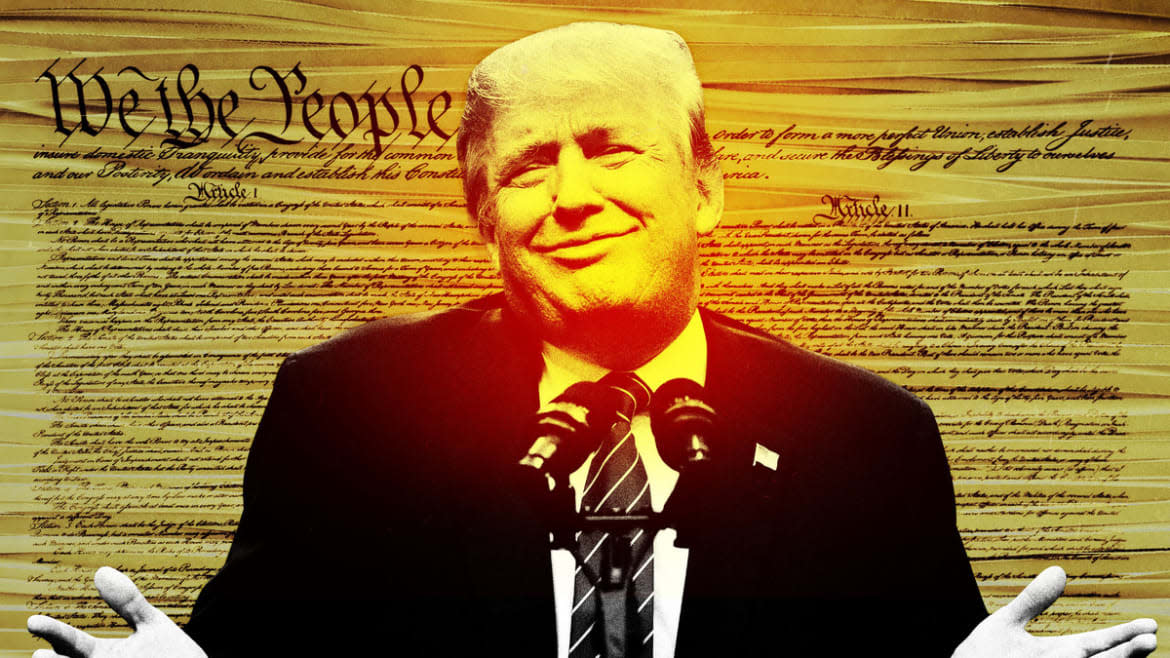Donald Trump Doesn’t Respect (or Even Understand) the Constitution

- Oops!Something went wrong.Please try again later.
The “revelation” that former President Donald Trump supports the “termination” of the U.S. Constitution—if that’s what it takes to make him president again—is hardly worthy of the name.
Trump’s comment—which he posted to Truth Social on Saturday and vehemently denied on Monday—is a slightly more explicit rejection of constitutional constraints than he’s ventured in the past. But it’s perfectly in line with his longstanding opposition to any inviolable limits on state power when that power is in his own hands, or at least wielded for his benefit. That Trump has never cared about the Constitution is the most obvious thing in the world.
Trump’s Political Future Hinges on How, Exactly, GOP Voters Want to Own the Libs
This apathy was evident well before Trump formally entered politics. One early indicator was his disturbing affection for eminent domain, the government’s authority to take private property for public use provided it makes “just compensation” to the owner. Eminent domain is grounded in the Fifth Amendment, so the bare concept is not unconstitutional, but in 2005 the Supreme Court substantially expanded the doctrine, allowing “public use” to include private development the government happens to think is a good idea.
The potential for corruption is clear, and the deeply unpopular ruling, Kelo v. New London, remains controversial to this day—but Trump absolutely loved it. He agreed with it “100 percent,” he said on Fox News around that time, and he had the personal history to prove it. In the late 1990s, Trump tried to use eminent domain to evict an elderly widow from her home of three decades in Atlantic City. He wanted to replace her house with a limousine lot for his casino.
Thanks to the efforts of the Institute for Justice, a libertarian public interest law firm, the widow kept her home. But Trump kept something, too: his penchant for trying to bend or disregard the law when it suits him, and his transparent lack of interest in constraints on state projects and powers he finds desirable.
On both the campaign trail and as president, while insisting he is “with the Constitution 100 percent,” Trump made his anti-constitutionalism even more apparent. Though he has lately discovered a personal interest in the Fourth Amendment, in 2015, he said he “tend[s] to err on the side of security” over liberty where privacy rights and the war on terror are concerned. The same year, he talked of “look[ing] at the mosques” and implementing a national Muslim registry, two First Amendment violations.
The Unwelcome Return of Trump’s #Resistance Reply Guys
In early 2016, Trump again had gutting the First Amendment in view, this time wanting to “open up the libel laws” to infringe on the freedom of the press. That summer, he vowed to protect articles of the Constitution that do not exist. In 2017, he said constitutional checks and balances that required him to share power with Congress are a “very rough” and “archaic” system, which is “a really bad thing for the country.” That fall, he said asserting Fifth Amendment rights is proof of guilt. In 2018, he floated unilaterally ending birthright citizenship in violation of the 14th Amendment.
In 2019, Trump repeatedly claimed Article II of the Constitution gave him “the right to do whatever I want.” The same year, he argued he should be able to abuse national emergency declarations to expand his own power beyond constitutional boundaries because Democrats would do the same thing if given the chance. In 2020, he reportedly expressed interest in declaring martial law though the constitutional preconditions for it, per Ex parte Milligan (1866), had not been met. And just last month, he called for executing drug dealers after a two-hour trial modeled on communist China’s justice system, a blatant rejection of constitutional due process. By the standard of many of his Republican supporters, even Trump’s record on the Second Amendment falls short.
Surprise! The GOP Has an Even Bigger Problem With Its Activist Base Than the Democrats.
The easy explanation for this perjurious disregard for the Constitution is Trump’s self-acknowledged greed and willingness to ignore reality itself if it serves his purposes. But were I to venture a longer theory, it would be that Trump’s mindset on government is an odd and dangerous anachronism, a holdover from the pre-Enlightenment era when power accrued by inherent right of status instead of being duly apportioned by law. Trump has no use for the Constitution because his is a medieval perspective, his ideal society a world of natural hierarchy—and he, of course, is at the top, even if he has to terminate the Constitution to get there.
With all this on record, I ought to conclude with a list of concrete steps Trump’s Democratic opponents have taken over the last two years, while in control of the House, Senate, and White House, to meaningfully curtail the power of the presidency in case Trump (or anyone with a similar view of the Constitution) gains the office again. I ought to be able to end this article that way, but I can’t, because Democrats have done no such thing. They’ve found time to boost Trump’s imitators in the midterms, but robust structural limits for the executive are, as ever, too big an ask.
It’s almost like selfish disdain for the Constitution isn’t confined to Donald Trump.
Get the Daily Beast's biggest scoops and scandals delivered right to your inbox. Sign up now.
Stay informed and gain unlimited access to the Daily Beast's unmatched reporting. Subscribe now.
